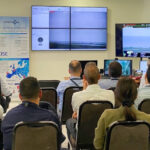As “the world’s first exit program for the intelligence community” the campaign Intelexit started last month. Employees from the secret services like the National Security Agency (NSA), the UK Government Communications Headquarters (GCHQ) and the German Bundesnachrichtendienst (BND) are to be supported to leave the institutions. A video with Bruce Schneier and Thomas Drake, the Vienna-based therapist Angelika Schneider and the former Stasi officer Walter Eichner explains the backgrounds, a flyer gives more details.
Intelexit is directed to all employees, not only those who work on surveillance programs or take part in drone wars. Concerned people, who see themselves in moral conflicts, should be helped to receive counselling, therapy and legal support. Those who have hesitations, can try a selftest on the campaigns website.
This interview was conducted with some of the organisers briefly before the start of the campaign.
With Intelexit you are addressing secret service members and their relatives. Will you briefly explain what it is about?
We want to spread the message that if you face moral conflicts working for intelligence, it is a perfectly legitimate act for you to leave. We want to offer such individuals a window of opportunity and the support that they might need in order to exit the intelligence community.
Normally we speak of very abstract and complex subjects regarding privacy, fundamental freedoms, surveillance, etc. Here we are speaking about the humans who are at the heart of it, we speak *to* them, addressing the question of surveillance as a human problem: the problem of men and women who are inside this “rabbit hole” of intelligence agencies, who witness lies, crimes and injustices, and may genuinely feel very uncomfortable with all this yet don’t know what to do.
It is about an outstretched open hand to them, telling them: “We see you are there, in this terrible situation of a cognitive dissonance between the values you believe in and the reality of what you do everyday. We are here to help you.”
Furthermore we believe that the more people who disband from these structures, the stronger the message to governments, to the agencies and to the public that there is something very wrong.
As we see this extremely violent attack on whistleblowers and those who try to speak the truth (think of Bradley Manning, Edward Snowden, Julian Assange, Jeremy Hammond, Barrett Brown, Aaron Swartz, etc.), we want to send a positive message to the ones who may chose to become the next whistleblowers: we can help you to get back to a normal life, to reconnect with your values.
Back to normal life?
To me as an activist familiar with the questions of defending human rights and opposing surveillance, it is striking that our discourse is very often generating anxiety, and often vilifying the members of the “intelligence community” as our enemies. When you talk to them in private you sometimes realize that they *know* they are part of some misuses, some abuses of these practices, and that they themselves are willing to find a way to fix things. So maybe it is only when we can work with them that we can obtain a leverage to end mass surveillance and its abuses.
Intelexit speaks to members of the “intelligence community” at large, across all borders and boundaries of services. Initial actions will be targeted in three countries worldwide, but we hope to inspire others in other countries to launch similar actions.
Which countries, which services?
For the moment mainly BND, NSA, GCHQ.
How will you make that public? I mean, how will the employees take notice, not only press and activists?
There are billboards posted in front of these agencies then we will pool resources to enable the collective emailing, calling, faxing of their offices and distribution of flyers in front of their buildings.
Is it more yet another campaign to abolish secret services? Or do you think that members of secret services and their relatives will get in touch with you?
Definitely! We are sending a very strong message, and this is the first initiative of its kind to bring hope to many people in a very desperate situation. In the research of this project we met with a number of current and former members of the intelligence community, as well as their friends and family. We kept hearing the same themes repeated over and over and we heard a very strong call for help. It is quite clearly a very necessary campaign.
As for abolishing secret services, we are saying quite clearly, step out and in so doing let’s put more pressure on these services to act responsibly and respect the democracies they are a part of.
There were several whistleblowers in recent years, but it did not seem that they were so much inspired from each other? Even if their coming out was very important…
So we know there is at least one such individual, so there might be more. It is very precious that we attempt to speak to them humanely, as they are probably the next whistleblowers that will come out publicly.
We saw that Edward Snowden got his inspiration by learning from previous whistleblowers. He improved his strategy based upon those who did it before him, he worked out his “exit scenario” before blowing the whistle, he ensured he didn’t have the documents with him once they were transmitted, worked a release plan beforehand, etc.
So it is about enabling past whistleblowers and future whistleblowers to help each other, to contribute their experience of good practices and share knowledge about how to optimize the path to blowing the whistle and more importantly to get to a good life once the whistle has been blown.
We don’t just want to help those who later might be active whistleblowers. This is a very individual decision and should not be a condition for our campaign. Not everybody needs to become a hero. A first step is: Stop to work there. Stop to harm our society. Exit.
That sounds a bit like facilitation of treason?
Landesverrat! Exactly! Sometimes what is called “treason” by some is called “bravery” by others. Sometimes breaking the law is the only way, in a corrupt system, to reveal the truth and expose crimes. It is a choice for individuals to make, deep in their consciousness. Given the current state of the debate on mass surveillance we can affirm that *we need more whistleblowers*! We need more insiders who will make the courageous effort of stepping up and pushing information out to the world. It may be one of the only ways to have a public debate and to hope, as citizens, to control these institutions that have become wild, dangerous and unaccountable.
The point of the campaign is also to inspire people who don’t necessarily want to whistle-blow but want to leave. In the same way that a strike functions, when say miners stop working to protest about poor conditions, we can see a similar strategy working here.
Why do you target secret services, which habe been in focus very much over the last two years and targeted by campaigns to abolish them. Wouldn’t it be as important to address police authorities, and to see that their corruption, racism, abuse and murder could be punished?
There are many important issues in the world… often they are connected together. It is important to reach out to members of the intelligence agencies because by opposition to the members of many other institutions, they live and work in total opacity, often in isolation, and there is usually no way for them to be connected to “normal humans”, outside of this machine. They usually cannot even speak the truth to their friends and family.
So the situation of these people working in secret for secret organisations secretly violating our freedoms in massive ways is very peculiar. We thought of Intelexit as a way to collectively shine light down in the “rabbit hole”, a light at the end of the tunnel, as to make a bridge to these people.
It is not only about mass surveillance, but also drone warfare. What is your criticism targeting exactly?
Mass surveillance is useless to prevent terrorism, rather it is being used today for a wide range of profoundly anti-democratic actions: economic espionage (which in practice amounts to having spy agencies work for corporations!), political espionage, social pressure and manipulation. It is also used to aggregate meta-data in profiles and use predictive algorithms to target individuals, either to surveil them more intensively, or to target them for drone strikes.
It is important to expose the fact that hundreds if not thousands of people in the world were killed by drones as a result of data traces they left, that got aggregated and shared between countries through mass surveillance, by those intelligence agencies, without any form of democratic oversight.
Why not mentioning Russia, China and Israel then in the announcements? People like Andrej Soldatov or the bunch of 43 former members of Unit 8200 do quite a good work on stressing efforts of their governments to undermine freedom and privacy in the internet as well?
We begin the campaign focussing on three Western democracies which have intelligence agencies who are considered out of control. However we are quite clearly critiquing the concept of such secret and powerful structures in democracy today. We hope that people in other countries will also join us and speak to members of these institutions as well.
Secret services are not only targeting the internet, they (and police as well) also pay informants or act undercover with a fake legend in different environments. How is this part of the campaign?
With the campaign we do not only address employees of intelligence agencies working on mass surveillance, but all the employees. All of them who in their everyday work witness lies, crimes or abuses and feel bad about it, and wish to find an exit path. Many of them signed up because they believed in ideals and values they wanted to serve (the constitution, freedoms, democracy) and end up violently working against the very ideals they once hoped to preserve. This can lead to profound distress. In such cases they may have lost hope, we want to give them some!
Probably the people you target see themselves as democrats, maybe patriots. What makes you convinced that some of them might quit their safe job?
In our meetings with members of the secret services, we were struck by how much it appeared like he was facing a moral conflict, down inside. A form of cognitive dissonance between “I am here to defend my country’s constitution, my fellow citizens’ freedoms, and democracy” and a reality of “I am asked to break the constitution, and to subvert freedom and democracy”. People affected by cognitive dissonance sometimes have a very hard time dealing with it and end up in profound distress. Sometimes they try to bury it, to build mental walls around it, or end up compensating with something else: alcohol, drugs, violence, etc.
If they really want to quit, you probably can’t help them via e-mail. The support you announce needs personal contact. How could that work then?
Every case is individual and what they need will differ from person to person. For some it might be just a conversation, or information, for others it might be more intensive counselling. We will provide what is necessary. We are building up a very strong network of individuals and organisations who will be able to provide the necessary support tailored to each individual.
So you give advice for exiting secret service members? Counselling?
Exactly. We will try to pool our resources, mostly human and legal, to help these individuals to find an honourable way of exit, that will serve both themselves and democracy at the same time.
What are you doing with classified informations that you might receive. Or the campaign is not about that?
We are not asking for classified information specifically, we are asking people to leave first and foremost. To whistle blow or not is a very individual choice. But of course a secure means of contact is still important. We do not doubt that the intelligence agencies will be very curious about what we are doing and probably try to intercept our communications.
We are working on providing as much of a secure channel as possible to contact us. We are trying to have an .onion contact form encrypting contact messages with GPG. But more importantly we emphasize the human aspects of security, things intel people should already be aware of. This includes not using your own day-to-day computer nor your own email address to contact us, to contact us through somebody else (a proxy), etc.
We will provide the first necessary steps for these people to make peace with themselves and with society before they can consider becoming whistleblowers.
Then if these people want to release confidential information, this would be handled through the support of Wikileaks or Der Spiegel. Our campaign will mostly be a bridge for people to cross, an exit path back to democracy, a way to escape their isolated situation.
Image: Intelexit campaign (all rights reserved Intelexit).




